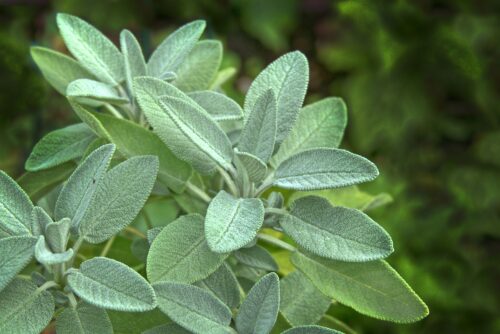
Sage Leaf & Oil (Salvia officinalis)
Salvia officinalis (sage, also called garden sage, common sage, or culinary sage) is a perennial, evergreen subshrub, with woody stems, grayish leaves, and blue to purplish flowers. It is a member of the mint family Lamiaceae and native to the Mediterranean region, though it has been naturalized in many places throughout the world. It has a long history of medicinal and culinary use, and in modern times it has been used as an ornamental garden plant. The common name “sage” is also used for a number of related and unrelated species.
Sage is an herb. The leaf is used to make medicine. There are many species of sage. The two most common species are common sage (Salvia officinalis) and Spanish sage (Salvia lavandulaefolia). Sage is used for Alzheimer disease, diabetes, high cholesterol, and symptoms of menopause. Sage might help with chemical imbalances in the brain that cause symptoms of Alzheimer disease. It might also improve how the body uses insulin and sugar.
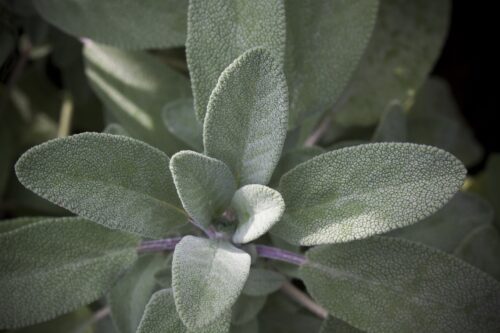
Like many herb and spice oils, Sage is helpful for digestive issues. It can help relieve symptoms of stress, such as emotional exhaustion, nervousness, mental fatigue, and head and neck tension. Also, Sage is a powerful oil that can be neurotoxic in large amounts. It is recommended to be used at a maximum dilution of 0.4%. This oil should also not be used while pregnant or breastfeeding.
The health benefits of sage essential oil can be attributed to its properties as an antifungal, antimicrobial, antioxidant, antiseptic, anti-inflammatory, antispasmodic, antibacterial, cholagogic and choleretic, cicatrizant, depurative, digestive, disinfectant, emmenagogue, expectorant, febrifuge, laxative, and a stimulating substance.
This essential oil is extracted by steam distillation of sage leaves and is constituted mainly of aesculetin, alpha-humulene, alpha thujene, alpha-thujone, alpha-terpineol, alpha terpenes, alpha-pinene, alpha maaliene, aromadendrene, beta-pinene, beta copaene, beta-thujone, borneol, camphor, cineole, caryophyllene oxide, camphene, delta cadinenes, linalool, limonene, myrcene, ocimene, octanol, paracymene, para cymenol, salviol, terpineol, thujanol, and terpinolene.
Blending: Essential oil of sage blends well with the essential oils of Clary Sage, Geranium, Ginger, Lavender, Orange, Vetiver, Neroli, Rosemary and Tea tree.
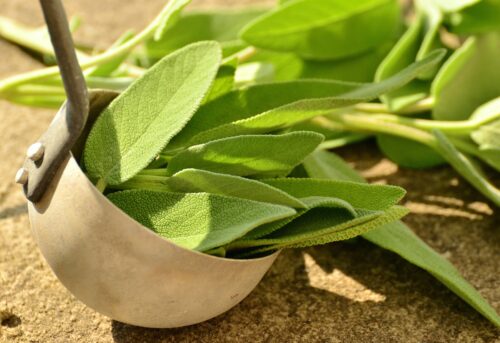
Benefits of Consuming Sage
Alzheimer disease. Taking extracts of two different sage species, common sage and Spanish sage, for 4 months seems to improve learning, memory and information processing in people with mild to moderate Alzheimer disease.
Diabetes. Taking common sage leaf extract three times daily for 3 months lowers fastingblood sugar and average blood sugar over time (HbA1c) in diabetes patients.
High cholesterol. Taking common sage three times daily for 2 or 3 months reduces “bad” low-density lipoprotein (LDL) cholesterol and blood fats called triglycerides. It also increases “good” high-density lipoprotein (HDL) cholesterol, in people with high cholesterol.
Symptoms of menopause. Research shows that taking common sage extract for 8-12 weeks improves symptoms of menopause, especially hot flashes and night sweats.
Decline in memory and thinking skills that occurs normally with age. Taking a single dose of common sage extract might improve some measures of memory in healthy older adults.
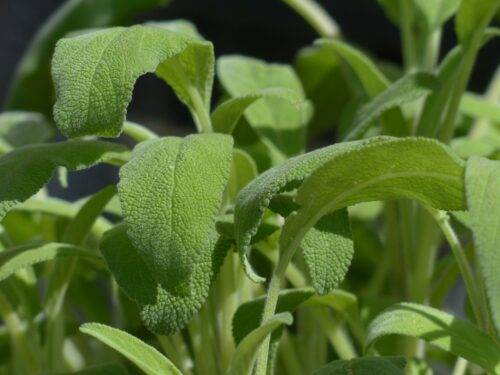
Hot flashes in men receiving androgen deprivation therapy (ADT) for prostate cancer. Early research shows that taking common sage extract three times daily for 4 weeks reduces the severity and frequency of hot flashes in men receiving this treatment.
Lung cancer. Some research suggests that people who regularly use sage as a spice may have a 54% lower chance of developing lung cancer than those who don’t use sage as a spice.
Memory. Taking a single dose of common sage extract or Spanish sage essential oil by mouth seems to improve some measures of memory in healthy adults. But these sage species do not seem to improve memory when used as aromatherapy.
Sore throat (pharyngitis). Using a spray containing common sage extract 15% reduces throat pain in people with a sore throat. But sprays containing higher (30%) and lower (5%) amounts of common sage extract do not seem to reduce throat pain.
A hormonal disorder that causes enlarged ovaries with cysts (polycystic ovary syndrome or PCOS). Some research shows that taking sage helps to reduce some, but not all, symptoms in people with PCOS.
Sunburn. Applying an ointment containing common sage extract to the skin after exposure to UV light seems to reduce the development of skin redness.
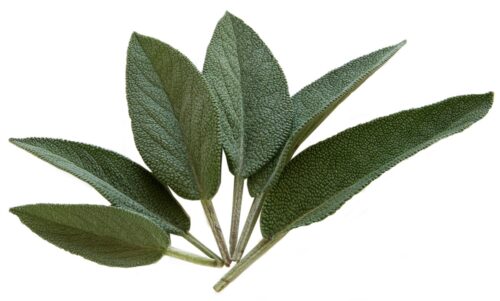
Dosing BY MOUTH:
For Alzheimer disease: 1 gram of sage per day. A dose of sage extract, gradually increased over time to 2.5 mg three times daily, has also been used.
For diabetes: 500 mg of common sage extract has been used three times per day for 3 months.
For high cholesterol: 500 mg of common sage extract has been used three times per day for 2 or 3 months.
For symptoms of menopause: 300 mg of common sage extract has been used daily for 12 weeks. Also, 280 mg daily of a specific thujone-free common sage extract (Sage Menopause, Bioforce AG) has been used for 8 weeks.
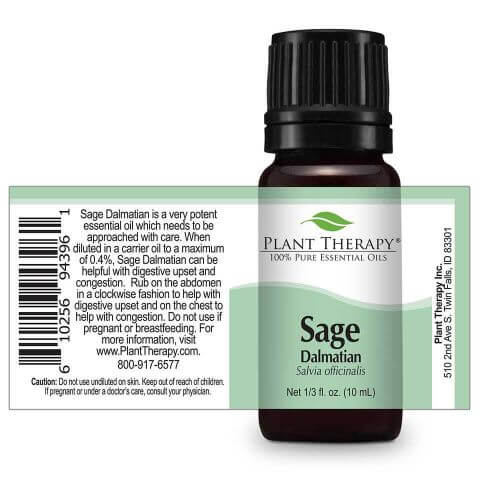
Benefits of Using Sage Oil
Antifungal: The presence of camphor and camphene in this essential oil gives it an antifungal property. This oil can inhibit fungal infections, both internally and externally, and gives relief from fungal infections like dysentery, skin diseases, Athlete’s Foot or dermatitis. This property is one of the causes behind its use in skincare products.
Antimicrobial: The components in sage essential oil which give protection against fungal infections also provide protection against microbial infections too. Therefore, you can protect small wounds or cuts from developing irritating or potentially dangerous infections, as confirmed by a report published in the African Journal of Biotechnology.
Antibacterial: This oil is equally useful at countering bacterial infections since it kills bacteria and inhibits their growth in the body. This property can also be used to heal ailments like bacterial infections in the ears, nose, throat, eyes, genitals, urethra, colon, intestines as well as on the skin and in wounds.
Antioxidant: This is perhaps the most valuable aspect of this essential oil and the reason behind its extensive use in anti-aging and skin treatment products. Sage gets it potent antioxidant power from rosmarinic acid and carnosic acid. Antioxidants, as the name suggests, act against oxidants or free radicals in the body, which are the main causes of aging. These antioxidants slow down aging and prevent symptoms like wrinkles, sagging skin, and muscles, reduction in vision and hearing capabilities, malfunctioning of the brain, memory loss, degeneration of tissues, macular degeneration, and nervous disorders.
Antiseptic: Since it has antimicrobial, antibacterial, and antifungal properties, it serves as an antiseptic for wounds, surgical incisions, post-natal injuries, ulcers, and sores.
Anti-inflammatory: It reduces inflammation on the skin, inflammation due to fever, and prevents the entry of poisonous material into the bloodstream. It also reduces the effects of excessive intoxicants and narcotics, ingestion of excessive salty or spicy food, the influence of hot winds, etc. A study in Pharmaceutical Biology journal suggests that it helps cure inflammation in the stomach, intestines, and excretory tracts too.
Antispasmodic: This property of sage essential oil is useful in treating all problems that arise from spasms, including pain in the stomach, chest, and intestines, as well as coughs, convulsions, and cramps.
Cholagogue & Choleretic: According to the International Journal of Biology, sage promotes the discharge of bile. Sage essential oil helps in digestion, soothing the stomach, and improving the functionality of the whole digestive system against inflammation caused by excessive acids. It also neutralizes acids in the stomach and the bloodstream, thereby providing relief from acidity and acidosis, which in turn protects us from peptic ulcers due to acidity, as well as from boils, eruptions, and skin diseases that occur when acid levels rise in the blood.
Cicatrisant: This is yet another property which has given sage essential oil a strong place in the world of cosmetics as a key ingredient of anti-mark and anti-spot cream. Sage oil helps to eliminate scars, post-natal abdominal stretch marks, and blemishes caused due to boils, pox, and sores. It also helps in quick healing of wounds and incisions.

Depurative: Sage essential oil speeds up the removal of toxins from the blood through excretion or sweating and thus purifies the blood, acting as a depurative.
Digestive: It acts as a digestive medicine in case of indigestion by facilitating the decomposition of food. It does so by promoting the secretion of bile and gastric juices and by inhibiting microbial growth in the digestive system, which interferes with the digestive process.
Disinfectant: The antibacterial, antifungal, antimicrobial, and antiseptic properties of essential oil of sage make it an effective disinfectant, as it gives sound protection from both internal and external infections.
Emmenagogue: This essential oil regularizes menstrual cycles and helps relieve obstructed menses. It activates certain hormones, such as estrogen, which helps to bring about clear menstruation and gives relief from problems like a headache, nausea, weakness, fatigue, depression, mood swings, and other associated symptoms of periods.
Expectorant: It can give you relief from a cough, cold, and infections in your chest and respiratory tracts. It also provides relief from congestion that results from the common cold.
Febrifuge: Sage essential oil reduces fevers by fighting infections and reducing inflammation caused by them.
Laxative: It facilitates excretion and eliminates constipation by promoting the discharge of certain fluids, as well as stimulating the intestines.
Stimulant: If all the properties of this essential oil are to be described with a single term, ‘stimulant’ would be the appropriate one. Most of the properties it displays are different expressions of this property. It stimulates the brain, nervous system, liver, spleen, and the circulatory and excretory systems, thereby activating and optimizing them.
Other Benefits: Sage essential oil helps to manage dermatitis, herpes, psoriasis, sinusitis, asthma and bronchitis, accumulation of phlegm, cerebral palsy, depression, sciatica, and lumbago as well as induces mental stability, alertness.
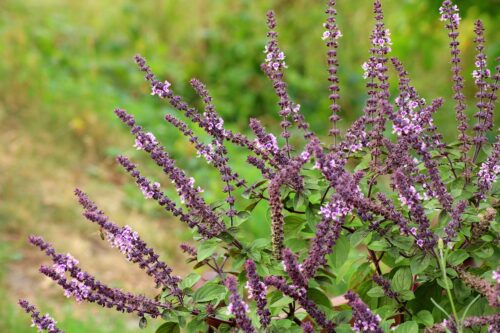
Side Effects of Using Sage
When taken by mouth: Sage is likely safe in amounts typically used in foods. It is possibly safe when taken by mouth in medicinal amounts, for up to 4 months. But sage is possibly unsafe when taken by mouth in high doses or for a long time. Some species of sage, such as common sage (Salvia officinalis), contain a chemical called thujone. Thujone can be poisonous if you take too much. This chemical can cause seizures and damage the liver and nervous system. The amount of thujone varies with the species of sage, the time of harvest, growing conditions, and other factors.
Special Precautions and Warnings
Pregnancy and breast-feeding: Taking sage during pregnancy is LIKELY UNSAFE because of the possibility of consuming thujone, a chemical found in some sage. Thujone can bring on a woman’s menstrual period, and this could cause a miscarriage. Avoid sage if you are breast-feeding, too. There is some evidence that thujone might reduce the supply of mother’s milk.
Diabetes: Sage might lower blood sugar levels in people with diabetes. Watch for signs of low blood sugar (hypoglycemia) and monitor your blood sugar carefully if you have diabetes and use sage. The dose of your diabetes medications may need to be adjusted by your healthcare provider.
Hormone-sensitive condition such as breast cancer, uterine cancer, ovarian cancer, endometriosis, or uterine fibroids: Spanish sage (Salvia lavandulaefolia) might have the same effects as the female hormone estrogen. If you have any condition that might be made worse by exposure to estrogen, don’t use Spanish sage.
High blood pressure, low blood pressure: Spanish sage (Salvia lavandulaefolia) might increase blood pressure in some people with high blood pressure. On the other hand, common sage (Salvia officinalis) might lower blood pressure in people with blood pressure that is already low. Be sure to monitor your blood pressure.
Seizure disorders: One species of sage (Salvia officinalis) contains significant amounts of thujone, a chemical that can trigger seizures. If you have a seizure disorder, don’t take sage in amounts higher than those typically found in food.
Surgery: Common sage might affect blood sugar levels. There is a concern that it might interfere with blood sugar control during and after surgery. Stop using common sage as a medicine at least 2 weeks before a scheduled surgery.
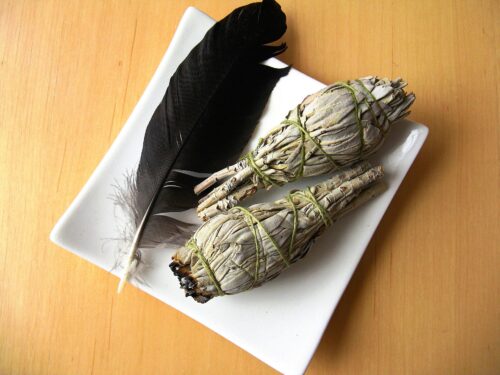
Medication Interactions
Medications for diabetes (Antidiabetes drugs) interacts with SAGE: Sage might decrease blood sugar. Diabetes medications are also used to lower blood sugar. Taking sage along with diabetes medications might cause your blood sugar to go too low. Monitor your blood sugar closely. The dose of your diabetes medication might need to be changed. Some medications used for diabetes include glimepiride (Amaryl), glyburide (DiaBeta, Glynase PresTab, Micronase), insulin, pioglitazone (Actos), rosiglitazone (Avandia), chlorpropamide (Diabinese), glipizide (Glucotrol), tolbutamide (Orinase), and others.
Medications used to prevent seizures (Anticonvulsants) interacts with SAGE: Medications used to prevent seizures affect chemicals in the brain. Sage may also affect chemicals in the brain. By affecting chemicals in the brain, sage may decrease the effectiveness of medications used to prevent seizures. Some medications used to prevent seizures include phenobarbital, primidone (Mysoline), valproic acid (Depakene), gabapentin (Neurontin), carbamazepine (Tegretol), phenytoin (Dilantin), and others.
Sedative medications (CNS depressants) interact with SAGE: Sage might cause sleepiness and drowsiness. Medications that cause sleepiness are called sedatives. Taking sage along with sedative medications might cause too much sleepiness. Some sedative medications include clonazepam (Klonopin), lorazepam (Ativan), phenobarbital (Donnatal), zolpidem (Ambien), and others.





























